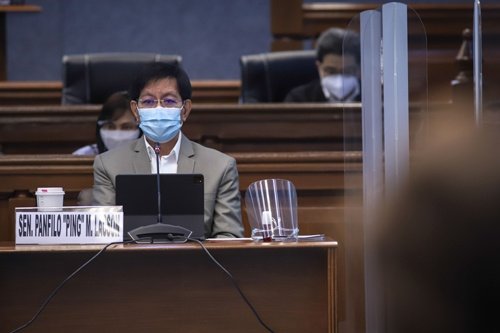
TWO senators have raised serious objections to a move to exclude telecommunications from the definition of public utilities in the amendatory bill for the 85-year-old Public Service Act now being rushed through the Senate.
Sen. Panfilo Lacson said the new PSA might run into a “constitutional challenge” for being against the intent of the 1986 Charter framers, as gleaned, he said, from minutes of the Constitutional Commission, which clearly stated telecommunications as a public utility the ownership of which must rest in Filipino hands.
For her part, Sen. Risa Hontiveros warned that allowing telecoms to be treated as a non-public utility, and therefore, exempt from the Constitution’s equity ownership limits, could give Chinese players greater control of a crucial sector—leverage that Beijing could use in its ongoing maritime disputes with Manila over the West Philippine Sea.
Lacson and Hontiveros aired their misgivings Monday night as the Senate opened plenary interpellations on the PSA, one of three major economic bills certified urgent by Malacañang.
Sen. Grace Poe, chairman of the Senate Public Services and Franchises panel, is sponsoring the measure to amend the Commonwealth-era PSA.
Taking the floor, Lacson reminded colleagues that “I have been very consistent in my position that in this day and age of global technology, the world is becoming smaller and smaller,” adding that: “if the country does not open up our economy to foreign investments, I am afraid we can never be competitive.”
He added, however, that “no matter how good our intentions are along this line, we might be open to possible legal challenges bordering on constitutional issues that may be raised later against this measure.”
Lacson then explained: “One of the salient features of the measure is to define public utility to include only three: distribution of electricity, transmission of electricity, water pipeline distribution systems and sewerage pipeline systems,” he said.
What the, he asked, is the basis of limiting the definition of public utility to those three industries?
In reply, Poe pointed out that “supposedly…these three industries were classified as public utilities because it is a natural monopoly…. Meaning it would be less cost-effective and also more complicated to open it up to operators or providers.”
Lacson then drew attention to the deliberations of the Constitutional Commission on the provision on public utilities between August and September 1986.
He read aloud excerpts of the September 29, 1986 deliberations involving Commissioners Suarez and Christian Monsod. Recalling discussions on (Section 11 Article 12 national economy and patrimony), Suarez told Con-com President Cecilia Munoz Palma, “that when we voted on this particular section we were thinking in terms of public utilities ownership. That was clearly understood and conveyed to the commissioners and we voted accordingly.”
Monsod said, “It was on public utilities but we also made it quite clear that telecoms is part of public utilities.”
“As a matter of fact,” he added: “in the presentation of Commissioner Hilario Davide Jr., in his move to increase it to 75 percent [foreign equity] against local equity, 75-25, he complained about the fact there was an undue concentration of discussions on telecoms.”
Lacson noted, “This is a series of discussions and deliberations. The debates centered on the foreign equity rather than the inclusion or exclusion of telecoms as defined under the classification of public utility. There’s no discussion or argument on telecoms being classified as public utility.”
He warned, “we might be open to some legal challenges later concerning this particular issue. So at the proper time, if I may propose an amendment, I would like to include telecoms in the definition of public utility if the sponsor and minority leader would be open to suggestion, just to avoid a possible legal challenge.”
Poe affirmed that “in informal discussions with colleagues, that’s also their main concern, telecoms.” She expressed confidence that Lacson can well illustrate “the concerns that might justify classifying telecoms as a public utility especially with the growing concerns of national security.”
Lacson added that besides the Con-Com deliberations showing the intent and purpose of Section 11 Article 12 under National Economy and Patrimony, “there were subsequent SC rulings” that were similarly based on this. “They defined utility. In fact, in a separate opinion penned by Justice [Dante] Tinga, he said legislation cannot define utility. It is a judicial function. In fact they are not also defining utility but are defining the nature of the business industry if it will fall under utility or services.”
Chinese control
For her part, Sen. Risa Hontiveros warned against increasing Chinese incursions “once 100-percent foreign ownership is allowed in the Philippines.”
She conveyed concerns that amendments to the Public Service Act (PSA), which will allow 100-percent foreign ownership of public utilities, will “make way for China to own crucial infrastructure in the Philippines.”
Hontiveros warned that “China may use this as leverage against the Philippines when it comes to disputes in the West Philippine Sea.”
It’s bad enough, she said, that “China has been relentless in its moves in the West Philippine Sea,” so, she asked, why should the Philippines even open the way for them to buy vital infrastructure?
The Chinese, she said in Filipino, “are already getting our natural resources in our oceans; let’s not give them the edge to control even our industries.”
Hontiveros noted that in the proposed amendments to the PSA, “the sectors to be opened up to 100-percent foreign ownership include telecommunications and transportation.”
Read full article on BusinessMirror


